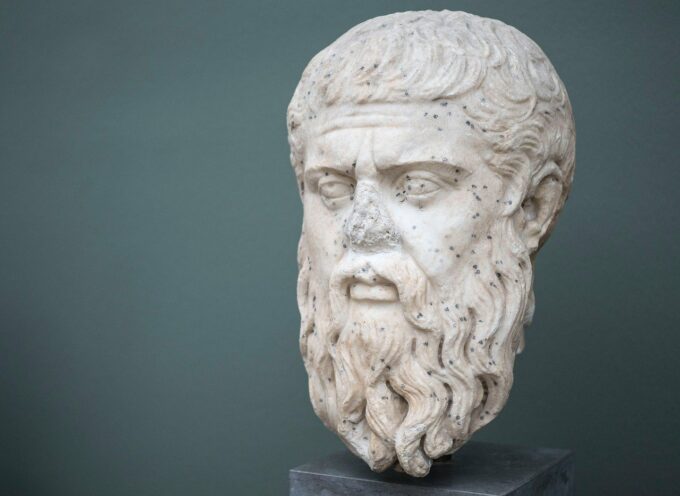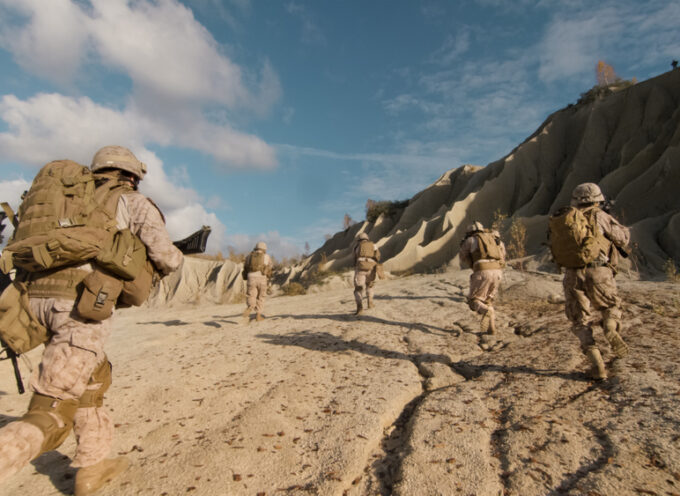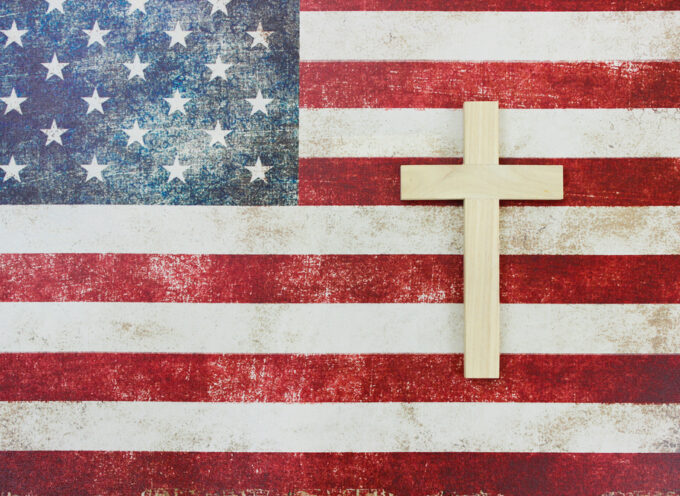In recent posts, we described the essence of the just war tradition, contrasted it with pacifism and jihadism, and described its foundations in ancient thought and its development through the medieval and early modern eras. In this post, we will explore the work of selected twentieth-century just war thinkers, each of whom made a signal contribution to the tradition. They include several theologians and ethicists, a literature professor, a professor of government, a historian, and a political theorist. Diverse as their vocations may be, however, they are united in rejecting idealistic approaches—whether pacificism or jihadism—to the problem of war and peace. We will discuss them in roughly chronological order.
Karl Barth
German theologian Karl Barth (1886-1968), the most influential theologian of the twentieth century, never explicitly used “just war” language in his writings. Yet, in Church Dogmatics and other writings, he outlined an ethic of warfare that is consistent with the just war tradition. His most significant contribution to the tradition is his rebuke of Christian theologians who denigrate the political and military dimensions of national life. Also significant is his surviving World War II-era correspondence. For example, during Hitler’s ascendancy, Barth penned a letter to Czech theologian Josef Hromadka, praising Czech resistance to the Nazis, going so far as to say, “Every Czech soldier who fights and suffers will be doing so for us too, and I say this without reservations—he will also be doing it for the church of Jesus, which in the atmosphere of Hitler and Mussolini must become the victim of either ridicule or extermination.”
C. S. Lewis
Having been wounded in combat during World War I, Christian writer and apologist C. S. Lewis (1898-1963) later reflected on warfare occasionally in his writings. Some of his most interesting reflections are found in correspondence after the war, but the most concentrated and significant treatments of warfare are found in two essays entitled, “Learning in Wartime” and “Why I Am Not a Pacifist.” He argues that Jesus’ instruction to “turn the other cheek” (Mt 5:39) is a prohibition against personal vengeance and retaliation rather than against war. He concludes the latter essay by writing, “This, then, is why I am not a Pacifist. If I tried to become one, I should find a very doubtful factual basis, an obscure train of reasoning, a weight of authority both human and Divine against me, and strong grounds for suspecting that my wishes had directed my decision.” Although Lewis is not among the twentieth century’s foremost just war theorists, he was and is an extraordinarily influential thinker who fits within the just war tradition.
John Courtney Murray
After the end of World War II and during the heightening of Cold War tensions, Catholic theologian John Courtney Murray (1904-1967) published a book-length defense of the just war tradition, We Hold These Truths. Murray rejected hard-nosed cynical forms of realism, on the one hand, and soft and sentimental pacifism, on the other hand. He was concerned that Christians had been unduly influenced by both trains of thought, and determined therefore to help steer them back into the just war tradition. Significantly, he urged Christian theologians and ethicists not to expand “just cause” to include preventive war and he urged them also not to cede authority to the United Nations the status of “supreme tribunal” in relation to potential or actual military conflicts.
Paul Ramsey
Paul Ramsey (1913-1988) is the greatest twentieth-century theologian of just war. Ramsey was an Augustinian realist who grounded his ethics of warfare in the biblical imperative of neighbor love, which sometimes involves the use of lethal force in the face of grave injustice. His writings played a central role not only in the resuscitation of the just war tradition but in the deepening of that tradition as it is applied to nuclear deterrence and asymmetrical warfare. His first book-length treatment of warfare, War and the Christian Conscience makes powerful arguments against both pacifism and cynical realism and argues that warfare must always be justified and limited by just war criteria. In a later text, The Just War, Ramsey expands on his earlier thought with an extensive exploration of the nature of political power, and an argument that such power must only be deployed toward the end of order and justice. Further, he explores the “international system,” arguing again against pacifism and cynical forms of realism.
William V. O’Brien
Georgetown professor of government William V. O’Brien (1923-2003) was the author of several books supporting the just war tradition, most notably The Conduct of Just and Limited War. Like his fellow Catholic thinker John Courtney Murray, he rejected the argument that pacifism is the only just response in an era of nuclear weapons. Famously, he wrote devastating critiques of the U. S. Catholic bishops’ pacifist pastoral letter, The Challenge of Peace, arguing that the bishops’ pacifism was an unjust response to injustice and that the bishops seriously misunderstood the threat posed by totalitarian nations and empires.
James Turner Johnson
James Turner Johnson (1938-present) is the greatest 20th century historian of just war. In Ideology, Reason, and the Limitation of War, he analyzes the rise and development of the just war tradition through the eighteenth century, paying attention to the philosophical, theological, and legal forces that have shaped it. In Just War Tradition and the Restraint of War, he picks up where he left off, historically, analyzing the development of the tradition up to the late twentieth century. In The Quest for Peace, he explores history’s three rival traditions in the ethics of warfare—pacifism, crusaderism, and just war—labelling them “sectarian pacifism,” “utopial pacifism,” and “just war,” respectively. In a number of other books, Johnson further explores unique challenges of contemporary warfare, including nuclear weapons, asymmetrical warfare, and Islamic jihad, as well as analyzing specific wars such as the first and second Gulf Wars.
Michael Walzer
Political theorist Michael Walzer (1935-) is probably the most influential just war thinker of the last hundred years and his book Just and Unjust Wars is probably the most influential just war book of the past century. Walzer’s approach is best described as eclectic and secular. Just and Unjust Wars elaborates on just war principles, but instead of organizing the book around those principles, he teases out those principles while describing the justices and injustices of numerous historical and global wars. Walzer argues that a nation should not use force against individuals or states unless that they have forfeited their rights. He argues that a state forfeits its rights if it has violated another state’s rights or threatened to use force in an unjust manner, and if its ability to govern has been dissolved by a people’s secessionist movement or by large-scale and grave violations of human rights. Additionally, he argues that once a person becomes a combatant, he forfeits his right to life and liberty. Significantly, he allows for intervention into the domestic affairs of other nations but only in the very limited instances in which the intervention protects that nation’s self-determination.
Jean Bethke Elshtain
Political ethicist Jean Bethke Elshtain (1941-2013) wrote prolifically on the ethics of warfare. A devout Catholic, she was especially concerned that political thought should not be severed from religious tradition and religious forms of reasoning, and thus drew heavily upon theologians such as Augustine and Pope John Paul II. She is best known for arguing that human beings are both created in God’s image and genuinely and truly corrupted by evil. With human beings thus possessing both dignity and depravity, any theory of warfare must take both into account. Pacifism can account for dignity but not depravity. Crusaderism can account for depravity but not dignity. The just war tradition, however, can account for both. She is further known for rejecting radical forms of patriotism and anti-patriotism, opting instead for an Augustinian model of “chastened patriotism.” Finally, she is known for defending the second Gulf War on the basis of an expanded just cause category that allows for preventive strikes.
Conclusion
This brings our historical survey of the just war tradition to an end. In coming posts we’ll look more closely at the particular principles of just war theory as well as begin to apply those principles to particular contemporary issues. In reflection on the figures we’ve surveyed, several things stand out as worth highlighting as we move forward. First, the just war tradition from its earliest days till now seeks to take human sin and depravity seriously. War is sometimes a justifiable and legitimate response to real injustice, and we must remain sober minded that humans will always be drawn towards injustice, especially those in power. Second, the just war tradition should equip us to view contemporary wars and conflicts with through a complex set of estimations and priorities. We should celebrate the ability to meet injustice with force on behalf of the downtrodden and afflicted. At the same time, we should mourn the reality that we must sometimes result to violence in defense of others or ourselves. Additionally, we should never be afraid to apply our convictions regarding just bases for war to contemporary conflicts. The nation which leaves behind its commitment to justice and restraint sets itself quickly on the path to nationalistic or ideological jihad.
Other articles in the “Ethics of Warfare” Series:
1. To Fight or Not to Fight? That is the Question.
2. What Kind of Peace Should America Seek in our War-Torn Era?
3. Why I am Peaceful but Not a Pacifist
5. Why I am a Proponent of the Just War Tradition
6. The “Founding Fathers” of the Just War Tradition
7. Seven All-Stars of the Just War Tradition
8. Eight Recent Champions of the Just War Tradition
9. 8 Criteria for Deciding When It’s Right to Go to War
10. 7 Moral Criteria to Guide Commanders during Battle
11. How Do Just War Principles Apply to Terrorism & Asymmetrical Warfare?
12. How Do Just War Principles Apply to Drone Warfare?
13. Future War: How do We Prepare Ethically for Radically New Forms of Warfare on the Horizon?
14. The Ethics of Special Operations Warfighting
Subscribe
Never miss a post! Have all new posts delivered straight to your inbox.







